Politics
A year on, how the Hamas attack has profoundly affected UK political life | Politics
When Shockat Adam, the newly elected independent MP for Leicester South, addressed his supporters at the July election count, he brought his speech to an end with a dedication – not to the constituents of the East Midlands city he now represents, but to people more than 2,000 miles away.
“This is for the people of Gaza”, he said, holding a Palestinian keffiyeh aloft.
Before 7 October last year it would have been almost unthinkable. A relatively unknown independent had overturned a 22,000 majority held by Labour heavyweight Jonathan Ashworth in a traditionally red seat. But these are different times.
This week marks one year since Hamas militants and allied groups unleashed its heinous attack on southern Israel, killing 1,200 people and taking 251 hostage.
In the wake of the attacks, Israel declared war in Gaza – a territory the UN considers to be under Israeli occupation – and began a relentless year-long military campaign in the densely populated strip. More than 41,000 people have been killed so far, most of them women and children, according to Gaza’s Hamas-run health ministry.
The conflict unfolding across the Middle East has continued to dominate headlines, with daily images from the war-torn region broadcast across the globe. The knock-on effect has been far-reaching. In the UK, political life has been played out to the backdrop of protest.
Adam’s victory in the general election this year was just one of four shock defeats for Labour MPs, beaten by independents who stood predominantly on a pro-Palestine platform.
Adam said his success was due to a widening “chasm” between the political classes and their constituents. He drew attention to a YouGov poll in May that showed the majority of people in the UK supported a ceasefire in Gaza.
“We have seen our country rightfully respond to the war in Ukraine,” he said. “The same sympathy, concern and courtesy was not extended to the Palestinians.”
Following his defeat, Ashworth said he experienced an election campaign of “vitriol” and “bullying”, adding Adam was elected on “on the basis of a foul and obnoxious lie, that I was responsible for genocide”.
Ashworth is not the only mainstream politician to note a toxicity they claim has infected politics since 7 October. The former justice minister and Conservative MP for Finchley and Golders Green, Mike Freer, announced his decision to step down in February after receiving a “constant string” of death threats, abuse and intimidation.
Adam condemns intimidation and said he was also subject to abuse during the campaign. “We have to be respectful of our democratic processes, at all costs, but we must not conflate questioning with intimidation,” he said.
He attributes his election win not just to his pro-Palestinian views but also to a growing distrust of politicians. “People were wanting something different, they just have lost faith in the political system,” he said.
Labour admitted the party’s stance on Gaza had cost it seats in the national and local elections. In the latter, Labour suffered an almost 18% drop in votes in areas of England where more than a fifth of people identified as Muslim.
The ballot box was not the only way for those calling for an end to the violence in Gaza to apply pressure. This weekend will mark the 20th pro-Palestine national march that has taken place since October, with hundreds of thousands expected to line the streets of London to demand an end to the war.
Ben Jamal, the director of the Palestine Solidarity Campaign and lead organiser of the march, said there has not been a mobilisation like this in British history since the suffragette movement.
“Marching is part of our response both to the genocide that has unfolded since October but, more broadly, our longer-term campaign addressing the dynamics of the oppression of the Palestinian people,” he said.
Whether the marches have managed to move the dial on UK government policy is up for debate, but their effect on the political discourse – and in particular the debate over freedom of speech and the right to protest – is undeniable.
after newsletter promotion
In November, former home secretary Suella Braverman described the demonstrations as “hate marches” and called on organisers to cancel their demonstration scheduled for Armistice Day.
In the same month, psychology teacher Marieha Hussain, outraged by the UK government’s position on the war and critical of Braverman’s earlier comments, held a placard depicting Rishi Sunak and Braverman as coconuts.
Unbeknown to Hussain at the time, a picture of her holding the placard had gone viral online, sparking fury by some who viewed the motif as a racial slur. Hussain was charged with a racially aggravated offence in May but was acquitted in a trial in September, in what some described as a victory for free speech.
The pro-Palestine marches have also been met with criticism from some Jewish groups, who say the protests make British Jews feel “unsafe”. In March, the government’s counter-terrorism tsar, Robin Simcox, said the protests were making London a “no-go zone” for British Jews. Jamal refutes the allegations and highlighted the consistent presence of a Jewish bloc at the marches.
Inevitably, the dissenting voice of young people found a platform in university demonstrations, which spread across campuses in the summer, part of a global student revolt that called for universities to divest from companies supplying arms to Israel.
Some universities conceded to the students’ demands. Goldsmiths, University of London agreed to launch humanitarian scholarships for Palestinian students, while Trinity College in Dublin said it would divest from Israeli firms.
However, the encampments sparked fear from some, with the Union of Jewish Students condemning the protests for creating a “hostile and toxic” atmosphere on campus. According to the president of the UJS, Sami Berkoff, such concern has persisted. She said the union had received more than 1,000 calls before the start of the current term from concerned parents and students regarding antisemitism on campus.
A charity that records hate incidents against Jews in the UK more broadly said it had logged more than 5,500 antisemitic incidents across the UK since 7 October – a 204% increase from the previous year. Dr Dave Rich, the Community Security Trust’s director of policy, said the spike in antisemitism has “spread faster than ever before”, with incidents “recorded online, in person and at the ongoing protests”.
The rise in antisemitism has also accompanied a rise in Islamophobia. The charity Tell Mama recorded 4,971 incidents of anti-Muslim hate since 7 October – the highest total in the past 14 years.
Tell Mama’s director, Iman Atta, said the hate incidents particularly targeted Muslim women. “This has been at both a street and online level, and British Muslims have been called ‘Hamas’, ‘Hezbollah’, ‘terrorists’ and ‘killers’,” she said.
Both sets of statistics, sobering in their own right, illustrate the nature of an issue that has driven a wedge between politicians, parties and people on the street. One year on, claim and counter-claim remains the language through which the war in Gaza is debated.
With tensions in the region continuing to escalate, it remains unclear for how much longer the conflict in the Middle East will continue to dominate and divide.
Politics
Angela Rayner given security council seat after Starmer U-turn
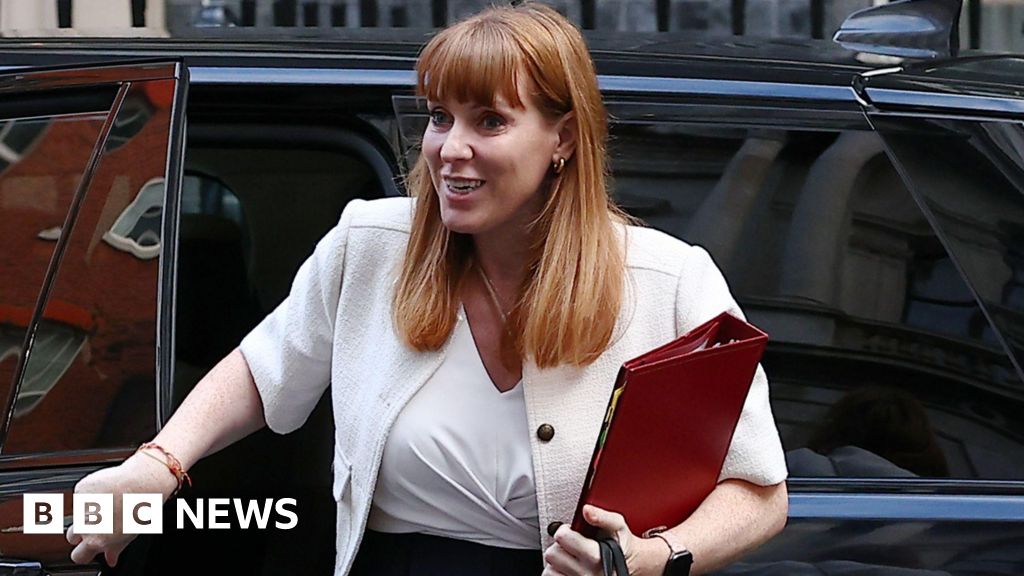
Angela Rayner has been made a full member of the UK’s national security council (NSC), following a U-turn by Sir Keir Starmer.
The deputy prime minister’s name did not appear on a list of ministers attending the committee published by the government last week.
But the document has now been re-published to include her as a member, confirming a move first reported by the Guardian.
The newspaper reported the new No 10 chief of staff, Morgan McSweeney, had pushed for the change in a bid to shore up her position.
Downing Street said she had previously attended NSC meetings, claiming the change merely “formalises” an expectation she would do so regularly.
First established under former prime minister David Cameron, the NSC brings together senior ministers and defence and intelligence chiefs for meetings on security issues. Its members are appointed by the prime minister.
It membership has fluctuated over the years and varies by issue discussed, but has typically included previous deputy prime ministers as standing members.
The only exception was Therese Coffey, who held the post during the 49-day premiership of Liz Truss.
Ms Truss who effectively put an end to the NSC by merging its functions with two other foreign policy committees, before it was later reinstated by Rishi Sunak.
Topics discussed at the NSC include foreign policy, defence, economic security, and resilience to security threats.
Its membership was slimmed down in July 2021under Boris Johnson, in a bid to keep discussions “focused and strategic”.
Alongside Ms Rayner, the committee is will be attended by Chancellor Rachel Reeves, Cabinet Office minister Pat McFadden, Home Secretary Yvette Cooper, Foreign Secretary David Lammy, Defence Secretary John Healey and the Attorney General Lord Hermer, and will be chaired by Sir Keir.
Mr Rayner, who is also the housing secretary, also holds seats on cabinet sub-committees discussing constitutional matters, home and economic affairs, and changes to employment law.
Politics
Fears children at risk due to out-of-town taxi licences

Taxi drivers are buying licences in Wolverhampton to get round tough rules aimed at protecting children, a Labour MP claims.
One-in-five private hire vehicles in England, such as Ubers and minicabs, have obtained licences from Wolverhampton City Council, where they are cheaper and less stringent than in other parts of the country.
Drivers do not have to get licences from their own local authority, under a law introduced in 2015.
Rotherham MP Sarah Champion says this allows drivers in her constituency to bypass tough safeguarding rules introduced after a 2014 child sex abuse scandal.
“The frustration is that in Rotherham we have probably the best regulation in the country and we’re trying to get that adopted nationally,” she told the BBC.
“We needed it because a lot of children who were being exploited were being raped in taxis or being transported from one children’s home to the abuse location through a taxi.
“The problem is those regulations are only set by the licensing authority so unless we get national minimum standards then drivers can go to a different local authority with different regulations and still drive in Rotherham.”
Only 1,781 of the 48,447 drivers currently licensed by Wolverhampton live in the city, with the rest operating as far afield as Newcastle, Somerset, Cardiff and Skegness.
The cost of a one year private hire licence in Rotherham is £210 and applicants must sit a child and vulnerable adults safeguarding test with a 100% pass rate. They also have to fit CCTV cameras to their vehicles, which can cost upwards of £350.
In Wolverhampton, by contrast, a one year licence costs £49.
Wolverhampton City Council insists it takes safeguarding seriously – and applicants receive training in at as part of a one-day course they have to take.
But Rotherham driver Lee Ward, a Unite the Union representative for South Yorkshire, said out-of-town licences were making taxi drivers “very frustrated”.
“Unfortunately a lot of taxi drivers around here were tarred by the same brush as those who were criminals,” he told BBC News.
“These are innocent drivers who were all of a sudden hit by so many extra regulations, training, CCTV.
“They’ve all gone through that – with open arms and a glad heart – just to sit next to a taxi who has a license in another authority 100 miles away, with officers who never come to Rotherham or Sheffield to check their drivers.
“It just makes a mockery of what they are trying to do.”
Wolverhampton City Council has generated millions from issuing licences to taxi drivers around the country but says the money has been ploughed back into reducing fees.
A City of Wolverhampton Council spokeswoman said: “The council would refute any suggestion of prioritising earning money over passenger safety.”
In a recent report, the council said: “As the number of licensees increase, the likelihood of a serious issue taking place.
“There has been serious child sex exploitation scandals revealed in Rotherham and Telford, which involved taxi drivers.
“Licensed vehicles provide a ‘camouflage’ which allows vehicles to traffic vulnerable people, as well as the offer of free trips for grooming. It is the service’s goal to minimise risks by all legal means.”
Earlier this year, Louise Haigh – who is now transport secretary but at the time was in opposition – raised the issue of child safeguarding in a debate on taxi licensing, saying she had worked alongside victims and survivors of child sexual abuse in Rotherham.
She said: “Following the scandal, Rotherham council set very high standards for its taxi drivers, including installing CCTV in cabs and requiring national vocational qualification level 3 on child safeguarding.”
She called on then Conservative government to bring in “robust legislation” and national minimum standards to protect women and girls.
Sarah Champion has written to Haigh asking for new laws to ensure taxis must be licensed “in the local authority area in which they routinely operate”.
A Department for Transport spokesperson said: “Everyone deserves to feel safe when using a taxi or private hire vehicle and we’re aware of concerns around licensing.
“There are safeguarding procedures in place and all drivers must undergo enhanced DBS checks, but we are carefully considering the options available to improve safety and accessibility in the sector.”
MPs are due to debate the issue later on Monday.
Politics
Arlene Foster says conversion therapy vote triggered removal as DUP leader
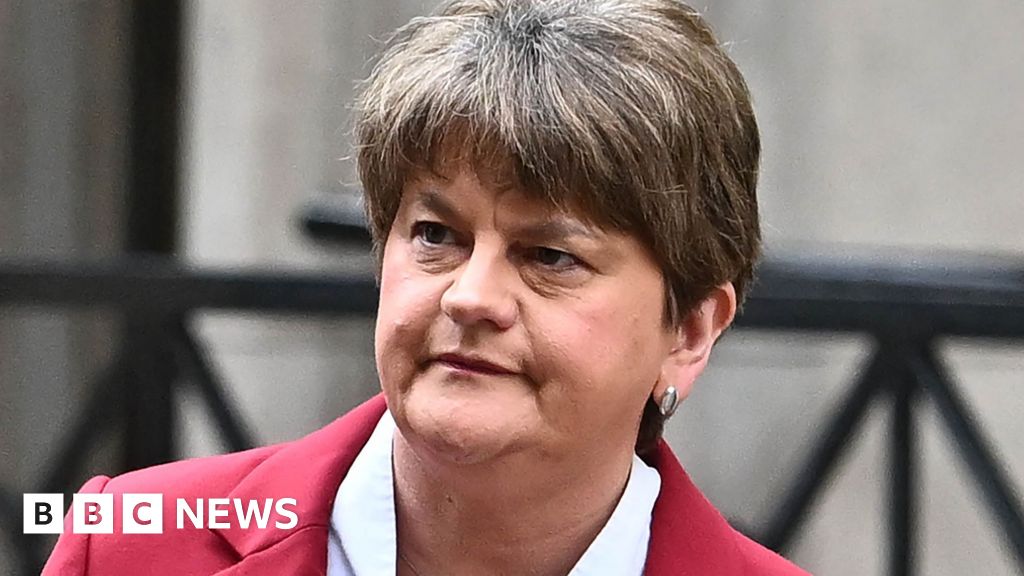
The majority of the party had voted against the motion, arguing that any legislation to outlaw the practice needed to ensure safeguards for churches.
Speaking to Michael Gove for a new Radio 4 podcast, Baroness Foster explained why she had chosen to abstain on the vote.
“I was aware that one of our members had a daughter who was gay – in an attempt to try and diffuse the situation, I said: ‘Well, we’ll just abstain.’
“It was a non-binding vote. But by saying just abstain, people got very angry about that and that was the trigger then for my removal, which came just a week later.”
Baroness Foster, who has since quit frontline politics altogether, said the party was also unhappy with how things had been handled with the Brexit negotiations while Boris Johnson was prime minister.
She also said some within the DUP were unhappy about Covid regulations, which Baroness Foster had been tasked with jointly leading the response to in the power-sharing executive, and that had “caused difficulties”.
“Because of Covid, a lot of things were happening remotely, I didn’t see a lot of it coming towards me,” the former first minister of Northern Ireland said.
“Certainly not of the magnitude that happened and the way in which it happened, because nobody had actually come to me and said: ‘Oh, by the way I think you should step down and it’s time for you to go’.
“Nobody came to me and said that, but the way they did it was that they obtained signatures on a letter of no confidence and that’s how it came about.”
She said that while some of those involved in the move later apologised, the “damage was done”, describing it as a part of her life which was not particularly pleasant.
Politics
Single patient records at heart of NHS 10-year plan

Single patient records will be at the heart of the government’s new strategy for the NHS in England, ministers say.
Currently, records are held locally by a patient’s GP and any hospitals they visit.
Work is already under way to join up the records and ministers say they will form part of its drive to improve efficiency in the NHS under its 10-year plan.
Campaigners have raised concerns about data protection but ministers say they are “absolutely committed” to protecting confidential medical information.
It comes as the government launches a new “national conversation” to inform the 10-year plan, which is due to be published in the spring.
One of the key themes of the plan will be moving from “analogue to digital” – and the single patient records will be a core part of that.
The government said it would speed up patient care, reduce repeat tests and medical errors.
Last year, a contract was awarded to the firm Palantir to create a database joining up individual records kept by local services.
It will allow patients and those treating them to access the information about their health.
Campaign group MedConfidential has warned having a single record like this will be “open to abuse”.
But Stephen Kinnock defended the move, saying the government was “absolutely committed” to protecting patient data.
He said safeguards providing a “cast iron guarantee” on security would be set out in a new bill that will be put before Parliament to push ahead with the move.
Alongside this, the NHS App will be further developed to allow patients to routinely use it to book appointments and check test results.
The hope is patients will begin to use it in the same way banking apps have revolutionised the way people bank.
The 10-year plan will also focus on moving care out of hospitals and into the community.
The government said local neighbourhood health centres, where patients can access GP, district nursing, physios and testing all under one roof, will form part of this.
But it said it wanted to hear from the public about their own ideas for change as part of the national conversation.
The pubic engagement exercise begins on Monday, with the launch of website change.nhs.uk.
Health Secretary Wes Streeting said: “The NHS is going through the worst crisis in its history but, while the NHS is broken, it’s not beaten. Together we can fix.
“Whether you use the NHS or work in it, you see first hand what’s great but also what isn’t working. We need your ideas to help turn the NHS around.”
Patients Association chief executive Rachel Power said she “warmly welcomes” the initiative.
She said: “For far too long, many patients have felt their voices weren’t fully heard in shaping the health service.
“This national conversation marks a significant step towards genuine patient partnership and puts patients at the heat of the NHS’s evolution.”
Politics
Woman admits hurling McDonald’s milkshake over Nigel Farage

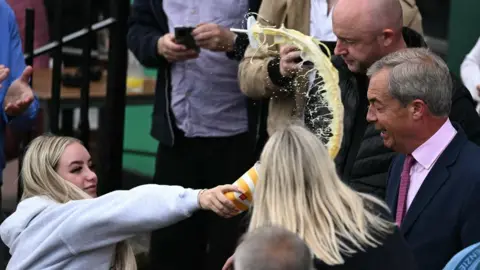 Getty Images
Getty ImagesA woman who threw a McDonald’s milkshake over Reform UK leader Nigel Farage during the general election campaign has pleaded guilty to assault by beating.
Farage was leaving a pub in Clacton-on-Sea on 4 June having launched his candidacy for the Essex constituency when a drink was hurled in his face.
Victoria Thomas Bowen, 25, of St Osyth Road in Clacton, had previously denied the charge, and will be sentenced at Westminster Magistrates’ Court in December.
Mr Farage, who won the seat in the 4 July vote, was campaigning at the Moon & Starfish pub on the seafront when the attack happened.
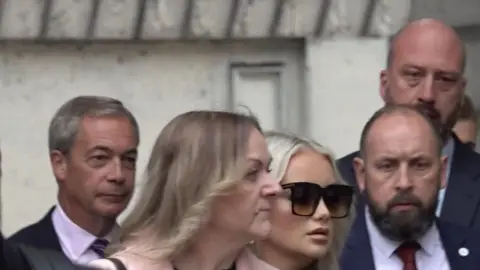 PA Media
PA MediaThomas Bowen also admitted criminal damage after causing £17.50 worth of damage to a jacket belonging to Mr Farage’s security officer James Woolfenden.
She changed her pleas to both charges before the start of her scheduled trial.
Deputy senior district judge Tan Ikram adjourned sentencing until 16 December.
 PA Media
PA MediaThe judge said : “This was an unprovoked, targeted attack, now on an elected Member of Parliament.
“I take a serious view of these offences.
“I am seeking a pre-sentence report which will consider all options for sentence.”
In a witness statement read out in court, Farage said “this incident caused me concern as I have only been going about my job” and that he tried to “have as much public engagement as possible”.
“I’m saddened that this has happened at a public campaign,” he added.
During a police interview Thomas Bowen said she saw a post online about Mr Farage’s attendance at the Wetherspoon outlet that day, the court heard.
She told officers she “does not agree with his political views” and decided to act because “she had the opportunity” when she saw him leaving the pub.
Giving details from her police interview, prosecutor Nishma Shah told the court: “She acknowledges that this was an assault and that the liquid would have gone over the jackets of him and others and caused them to get cleaning, but she states that Nigel would be able to afford this.
“She states she did not regret her actions.”
Thomas Bowen told police she did not intend the paper cup to hit Farage.
Politics
Former Tory minister David Gauke to lead prison sentencing review
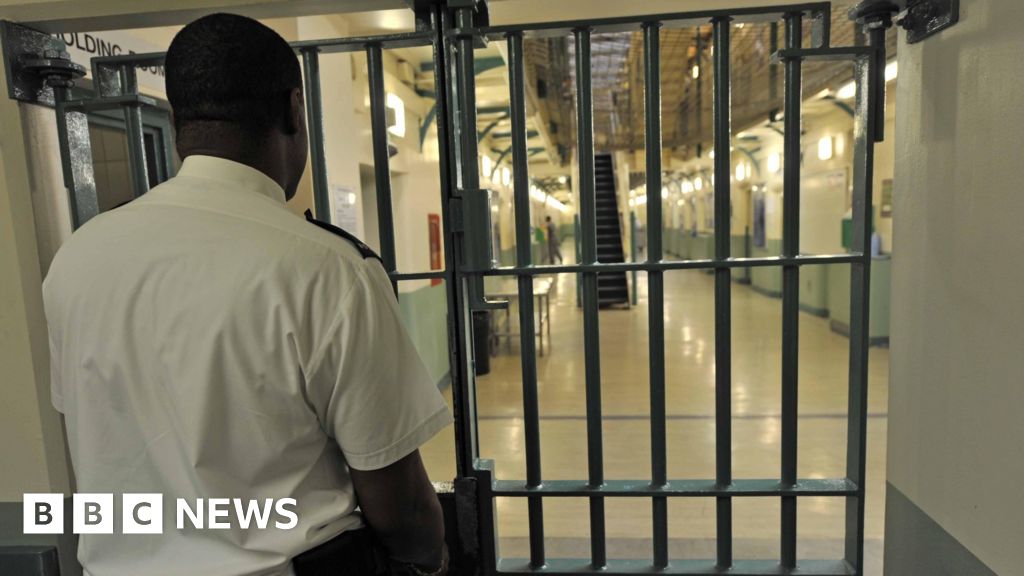
Prime Minister Sir Keir Starmer will appoint the former Conservative Justice Secretary David Gauke to lead a review of prison sentencing, the BBC has confirmed.
The Labour Party said in its general election manifesto it would establish a review of sentencing “to ensure it is brought up to date”.
The BBC reported earlier this month that Gauke was the frontrunner to lead the review.
His appointment is expected to be announced on Tuesday by Justice Secretary Shabana Mahmood.
Gauke was justice secretary under Theresa May from January 2018 to July 2019.
He then broke with the Conservative Party over Brexit, and stood unsuccessfully as an independent candidate at the 2019 general election. In July he rejoined the Conservative Party.
Gauke has previously suggested that jail terms of less than six months should be scrapped.
The prisons minister, Lord Timpson, has also previously argued that the prison population is too large.
As well as scrapping short sentences, the review is expected to consider toughening up community orders as an alternative to jail.
Community orders can include compelling someone to take part in rehabilitation programmes or carry out unpaid work for the local area such as removing graffiti.
Someone given a community order may also face restrictions on where they live or where they can go.
Several government sources have pointed to advances in technology, such as sobriety tags monitoring alcohol use, that could be used more widely to detain criminals in their homes.
Ministers are also exploring international examples of reducing crime in Texas and Louisiana, where prisoners can reduce their sentences by earning credits for good behaviour.
The review is expected to make its recommendations in the spring.
Since coming to power in July the government has had to grapple with severe overcrowding in prisons in England and Wales.
One of Labour’s first acts after winning the election was to implement an early release scheme, drawn up by the previous government.
Under the scheme, prisoners can be let out if they have completed 40% of their sentence, rather than 50%, as was previously the case.
The government has said offenders jailed for violent offences with sentences of at least four years, sex offenders and domestic abusers were not eligible.
Last month 1,700 prisoners were freed under the scheme and a further 1,100 will be released on Tuesday.
The policy is due to be reviewed in 18 months.
The government has defended the scheme saying it had “inherited prisons in crisis and on the brink of collapse”.
“Had that happened, the courts would have been unable to hold trials and the police to make arrests,” a government spokesperson added.
The Conservatives have said the government “badly managed” the scheme creating “serious public concern” about the process.
-

 Technology4 weeks ago
Technology4 weeks agoIs sharing your smartphone PIN part of a healthy relationship?
-

 Science & Environment1 month ago
Science & Environment1 month agoHyperelastic gel is one of the stretchiest materials known to science
-

 Science & Environment1 month ago
Science & Environment1 month ago‘Running of the bulls’ festival crowds move like charged particles
-

 Science & Environment1 month ago
Science & Environment1 month agoHow to unsnarl a tangle of threads, according to physics
-

 Science & Environment1 month ago
Science & Environment1 month agoMaxwell’s demon charges quantum batteries inside of a quantum computer
-

 Technology1 month ago
Technology1 month agoWould-be reality TV contestants ‘not looking real’
-

 Science & Environment4 weeks ago
Science & Environment4 weeks agoX-rays reveal half-billion-year-old insect ancestor
-

 Science & Environment1 month ago
Science & Environment1 month agoSunlight-trapping device can generate temperatures over 1000°C
-

 Science & Environment1 month ago
Science & Environment1 month agoLiquid crystals could improve quantum communication devices
-

 Science & Environment1 month ago
Science & Environment1 month agoQuantum ‘supersolid’ matter stirred using magnets
-

 Womens Workouts4 weeks ago
Womens Workouts4 weeks ago3 Day Full Body Women’s Dumbbell Only Workout
-

 Science & Environment1 month ago
Science & Environment1 month agoWhy this is a golden age for life to thrive across the universe
-

 Science & Environment1 month ago
Science & Environment1 month agoLaser helps turn an electron into a coil of mass and charge
-

 TV3 weeks ago
TV3 weeks agoসারাদেশে দিনব্যাপী বৃষ্টির পূর্বাভাস; সমুদ্রবন্দরে ৩ নম্বর সংকেত | Weather Today | Jamuna TV
-

 Science & Environment1 month ago
Science & Environment1 month agoA new kind of experiment at the Large Hadron Collider could unravel quantum reality
-

 Science & Environment1 month ago
Science & Environment1 month agoQuantum forces used to automatically assemble tiny device
-

 Science & Environment1 month ago
Science & Environment1 month agoNerve fibres in the brain could generate quantum entanglement
-

 Science & Environment1 month ago
Science & Environment1 month agoHow to wrap your mind around the real multiverse
-

 Technology3 weeks ago
Technology3 weeks agoUkraine is using AI to manage the removal of Russian landmines
-

 Science & Environment1 month ago
Science & Environment1 month agoA slight curve helps rocks make the biggest splash
-

 Science & Environment1 month ago
Science & Environment1 month agoITER: Is the world’s biggest fusion experiment dead after new delay to 2035?
-
Business3 weeks ago
DoJ accuses Donald Trump of ‘private criminal effort’ to overturn 2020 election
-

 Business2 weeks ago
Business2 weeks agoWhen to tip and when not to tip
-
News1 month ago
the pick of new debut fiction
-

 News1 month ago
News1 month ago▶️ Hamas in the West Bank: Rising Support and Deadly Attacks You Might Not Know About
-

 Science & Environment1 month ago
Science & Environment1 month agoTime travel sci-fi novel is a rip-roaringly good thought experiment
-

 News1 month ago
News1 month ago▶️ Media Bias: How They Spin Attack on Hezbollah and Ignore the Reality
-

 Science & Environment1 month ago
Science & Environment1 month agoNuclear fusion experiment overcomes two key operating hurdles
-

 News4 weeks ago
News4 weeks agoOur millionaire neighbour blocks us from using public footpath & screams at us in street.. it’s like living in a WARZONE – WordupNews
-

 Technology4 weeks ago
Technology4 weeks agoWhy Machines Learn: A clever primer makes sense of what makes AI possible
-

 MMA3 weeks ago
MMA3 weeks agoJulianna Peña trashes Raquel Pennington’s behavior as champ
-

 News2 weeks ago
News2 weeks agoMassive blasts in Beirut after renewed Israeli air strikes
-

 News2 weeks ago
News2 weeks agoNavigating the News Void: Opportunities for Revitalization
-

 Technology3 weeks ago
Technology3 weeks agoMicrophone made of atom-thick graphene could be used in smartphones
-

 Football3 weeks ago
Football3 weeks agoRangers & Celtic ready for first SWPL derby showdown
-

 Science & Environment1 month ago
Science & Environment1 month agoPhysicists have worked out how to melt any material
-

 MMA3 weeks ago
MMA3 weeks agoPereira vs. Rountree prediction: Champ chases legend status
-

 Technology2 weeks ago
Technology2 weeks agoSamsung Passkeys will work with Samsung’s smart home devices
-

 News2 weeks ago
News2 weeks ago▶ Hamas Spent $1B on Tunnels Instead of Investing in a Future for Gaza’s People
-

 Sport3 weeks ago
Sport3 weeks agoWorld’s sexiest referee Claudia Romani shows off incredible figure in animal print bikini on South Beach
-

 Technology3 weeks ago
Technology3 weeks agoThis AI video generator can melt, crush, blow up, or turn anything into cake
-

 Sport3 weeks ago
Sport3 weeks agoBoxing: World champion Nick Ball set for Liverpool homecoming against Ronny Rios
-

 TV2 weeks ago
TV2 weeks agoLove Island star sparks feud rumours as one Islander is missing from glam girls’ night
-

 Sport2 weeks ago
Sport2 weeks agoWales fall to second loss of WXV against Italy
-

 News3 weeks ago
News3 weeks agoHeartbreaking end to search as body of influencer, 27, found after yacht party shipwreck on ‘Devil’s Throat’ coastline
-

 News2 weeks ago
News2 weeks agoHeavy strikes shake Beirut as Israel expands Lebanon campaign
-

 Sport2 weeks ago
Sport2 weeks agoCoco Gauff stages superb comeback to reach China Open final
-

 Science & Environment1 month ago
Science & Environment1 month agoPhysicists are grappling with their own reproducibility crisis
-

 TV3 weeks ago
TV3 weeks agoPhillip Schofield accidentally sets his camp on FIRE after using emergency radio to Channel 5 crew
-

 Technology3 weeks ago
Technology3 weeks agoTexas is suing TikTok for allegedly violating its new child privacy law
-

 Sport3 weeks ago
Sport3 weeks agoSturm Graz: How Austrians ended Red Bull’s title dominance
-

 News2 weeks ago
News2 weeks agoFamily plans to honor hurricane victim using logs from fallen tree that killed him
-

 MMA2 weeks ago
MMA2 weeks agoPereira vs. Rountree preview show live stream
-

 MMA2 weeks ago
MMA2 weeks ago‘Uncrowned queen’ Kayla Harrison tastes blood, wants UFC title run
-

 MMA3 weeks ago
MMA3 weeks agoDana White’s Contender Series 74 recap, analysis, winner grades
-

 Technology1 month ago
Technology1 month agoMeta has a major opportunity to win the AI hardware race
-
Business3 weeks ago
Eurosceptic Andrej Babiš eyes return to power in Czech Republic
-

 News1 month ago
News1 month agoYou’re a Hypocrite, And So Am I
-

 Sport1 month ago
Sport1 month agoJoshua vs Dubois: Chris Eubank Jr says ‘AJ’ could beat Tyson Fury and any other heavyweight in the world
-

 Science & Environment1 month ago
Science & Environment1 month agoA tale of two mysteries: ghostly neutrinos and the proton decay puzzle
-

 Technology3 weeks ago
Technology3 weeks agoArtificial flavours released by cooking aim to improve lab-grown meat
-

 MMA3 weeks ago
MMA3 weeks agoAlex Pereira faces ‘trap game’ vs. Khalil Rountree
-

 Technology3 weeks ago
Technology3 weeks agoAmazon’s Ring just doubled the price of its alarm monitoring service for grandfathered customers
-

 Technology3 weeks ago
Technology3 weeks agoMusk faces SEC questions over X takeover
-

 News3 weeks ago
News3 weeks agoGerman Car Company Declares Bankruptcy – 200 Employees Lose Their Jobs
-

 TV2 weeks ago
TV2 weeks agoMaayavi (මායාවී) | Episode 23 | 02nd October 2024 | Sirasa TV
-

 Technology2 weeks ago
Technology2 weeks agoPopular financial newsletter claims Roblox enables child sexual abuse
-

 Money2 weeks ago
Money2 weeks agoWhy thousands of pensioners WON’T see State Pension rise by full £460 next year
-
Business3 weeks ago
Bank of England warns of ‘future stress’ from hedge fund bets against US Treasuries
-

 Business3 weeks ago
Business3 weeks agoChancellor Rachel Reeves says she needs to raise £20bn. How might she do it?
-

 Football3 weeks ago
Football3 weeks agoSimo Valakari: New St Johnstone boss says Scotland special in his heart
-

 News3 weeks ago
News3 weeks agoHungry customer left gobsmacked as two blokes riding giant HORSES stroll into local chip shop
-
Politics3 weeks ago
Rosie Duffield’s savage departure raises difficult questions for Keir Starmer. He’d be foolish to ignore them | Gaby Hinsliff
-

 News2 weeks ago
News2 weeks agoHull KR 10-8 Warrington Wolves – Robins reach first Super League Grand Final
-

 MMA2 weeks ago
MMA2 weeks agoUFC 307 preview show: Will Alex Pereira’s wild ride continue, or does Khalil Rountree shock the world?
-
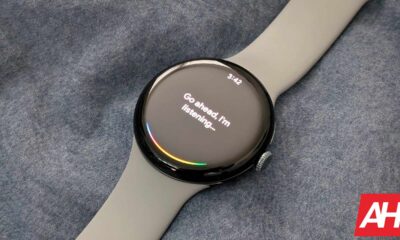
 Technology2 weeks ago
Technology2 weeks agoHow to disable Google Assistant on your Pixel Watch 3
-

 Technology2 weeks ago
Technology2 weeks agoA very underrated horror movie sequel is streaming on Max
-

 Sport2 weeks ago
Sport2 weeks agoMan City ask for Premier League season to be DELAYED as Pep Guardiola escalates fixture pile-up row
-

 Science & Environment1 month ago
Science & Environment1 month agoRethinking space and time could let us do away with dark matter
-

 Health & fitness1 month ago
Health & fitness1 month agoThe secret to a six pack – and how to keep your washboard abs in 2022
-

 Science & Environment1 month ago
Science & Environment1 month agoCaroline Ellison aims to duck prison sentence for role in FTX collapse
-
News1 month ago
The Project Censored Newsletter – May 2024
-

 Technology3 weeks ago
Technology3 weeks agoQuantum computers may work better when they ignore causality
-

 Technology3 weeks ago
Technology3 weeks agoUniversity examiners fail to spot ChatGPT answers in real-world test
-

 News1 month ago
News1 month agoNew investigation ordered into ‘doorstep murder’ of Alistair Wilson
-

 Sport3 weeks ago
Sport3 weeks agoWatch UFC star deliver ‘one of the most brutal knockouts ever’ that left opponent laid spark out on the canvas
-

 Technology3 weeks ago
Technology3 weeks agoEpic Games CEO Tim Sweeney renews blast at ‘gatekeeper’ platform owners
-

 Science & Environment3 weeks ago
Science & Environment3 weeks agoMarkets watch for dangers of further escalation
-

 News3 weeks ago
News3 weeks ago‘Blacks for Trump’ and Pennsylvania progressives play for undecided voters
-

 Technology3 weeks ago
Technology3 weeks agoApple iPhone 16 Plus vs Samsung Galaxy S24+
-

 TV2 weeks ago
TV2 weeks agoThe Sopranos: ‘Annoyed’ cast member criticises their final scene in HBO show
-

 Technology2 weeks ago
Technology2 weeks agoUlefone Armor Pad 4 Ultra is now available, at a discount
-

 News2 weeks ago
News2 weeks agoReach CEO Jim Mullen: If government advertises with us, we’ll employ more reporters
-

 Money2 weeks ago
Money2 weeks agoWetherspoons issues update on closures – see the full list of five still at risk and 26 gone for good
-

 News2 weeks ago
News2 weeks agoBalancing India and China Is the Challenge for Sri Lanka’s Dissanayake
-

 Technology2 weeks ago
Technology2 weeks agoThe best shows on Max (formerly HBO Max) right now
-

 MMA3 weeks ago
MMA3 weeks agoHow to watch Salt Lake City title fights, lineup, odds, more
-
Business3 weeks ago
Top shale boss says US ‘unusually vulnerable’ to Middle East oil shock
-

 Technology3 weeks ago
Technology3 weeks agoJ.B. Hunt and UP.Labs launch venture lab to build logistics startups
-

 News3 weeks ago
News3 weeks agoWoman who died of cancer ‘was misdiagnosed on phone call with GP’


You must be logged in to post a comment Login